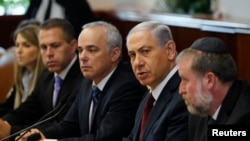Israeli Prime Minister Benjamin Netanyahu is vowing to keep longstanding worship arrangements in place at Jerusalem's Temple Mount, saying that Muslims can continue to pray at the Al-Aqsa mosque.
Netanyahu called Sunday for calm and restraint in the face of rising tensions over the site that have sparked almost daily clashes between Palestinian protesters and Israeli police. Jews consider it their holiest site, because of the temples that stood there in biblical times, while Muslims consider it their third holiest, after the cities of Mecca and Medina in Saudi Arabia.
The Israel leader told his weekly cabinet meeting that the site is open to people of all faiths, a message that he said has been relayed to Palestinian President Mahmoud Abbas.
"We will not change the worship arrangements and the accessibility that has been customary at the Temple Mount for decades. We are committed to preserving the status quo to Jews, Muslims and Christians. What is needed now is calm, what is needed now is responsibility and restraint. We are determined to maintain the status quo for all religions in order to prevent escalation from the Temple Mount, inside the Temple Mount and around the Temple Mount. It is very easy to ignite a religious fire but much harder to extinguish it. These messages have been relayed in the sharpest way possible to Abu Mazen (Mahmoud Abbas) and all the elements, and when I say all the elements, I mean all the elements in the space and also among us, what is needed now is calm," Netanyahu stated.
Abbas called the Israeli leader's call for the status quo a "step in the right direction."
The fate of the hilltop in east Jerusalem is part of the longstanding dispute between Israel, which captured it in the 1967 war, and the Palestinians, who want the area as part of the capital of a future Palestinian state.
Both Jews and Muslims are allowed to visit but only Muslims are allowed to pray there.
Jewish activists are pushing for changes in the rules to give them the right to pray at the site.
Violence between Israeli security forces and Palestinians erupted last month after Israeli police shot and killed a Palestinian gunman who wounded an ultra-conservative rabbi. The rabbi had attended a conference on granting Jews the right to pray at the Temple Mount.
Meanwhile, Israel has closed two border crossings with Gaza, the Palestinian enclave along the Mediterranean.
The military said it decided to close the Kerem Shalom and Erez crossings Sunday after a rocket was fired Friday into Israel from the Palestinian side without causing any damage or injuries. Israel said humanitarian aid will be allowed through the Erez crossing.
Israel said the rocket incident was the second strike since the end of Israel's 50-day war against Gaza militants in July and August.
Material for this report came from AP and AFP.




